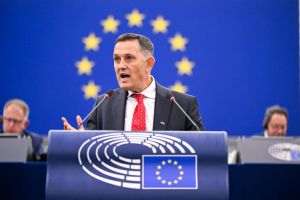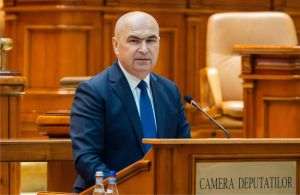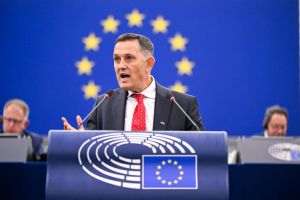The National Recovery and Resilience Plan (PNRR), which we have allocated for 30.4 billion Euros, will be put up for public debate on November 5, said Ioan Marcel Boloş, minister of European Funds. He said things were different when it comes to this plan, as each member state had to meet a few basic requirements, and the document had to have two components: reform and investments.
If we want to invest in transport, we will have to propose transport reforms. If we want to invest in health, we will have to propose health reform. The basic requirements are reforms and investments, and then there are the conditionalities related to investments: green transition, i.e. investments proposed to be in accordance with the rule of the green economy promoted by the European Union and digitalization - i.e. investments proposed to have the artificial intelligence component.
For example, in the projects concerning the water network, we need to put up smart meters for measuring water volumes and flows. In the project for transport infrastructure, we need to have IT systems for managing and directing traffic", minister Marcel Boloş said.
Regarding the structure of investments, the relevant minister pointed out that the PNRR is structured on three major areas. The first is related to transport infrastructure, where we must comply with the requirements on green transport and digitalization.
"That is why we need to focus more on railroad transportation, subway transportation, the acquisition of rolling stock. The budget is ambitious, 9.2 billion Euros, money added to the 8.9 billion Euros of the cohesion policy, which brings us to a total budget of 18 billion Euros for the transport policy", said Marcel Boloş.
The second area of PNRR is related to climate change, where the proposed projects will have a direct effect on agriculture in our country.
"We are discussing irrigation systems, which will support that important area, agriculture. Then we have drainage arrangements, cleanup to combat the appearance of swamps and to make land ready for farming. We have measures to combat soil erosion - we are talking about 3 million hectares, for which we will allocate 6.5 billion euros. The fight against soil erosion is the crown jewel of the PNRR, because we are talking about the agricultural potential of Romania and the support we are going to offer to the agricultural sector by implementing this project that will have, among other benefits, the restoration of green ecosystems and a positive impact on the environment", the Minister of European Funds said.
The third pillar of the PNRR concerns the business sector, and the proposed budget is 4 billion Euros. The relevant minister specified that, so far, Romania has allocated 1.3 billion euros allocated for the business sector, and this time the proposed budget is triple that and takes into account the agri-food, construction, large enterprises, tourism and the expenses that SMEs incur in modern fixed assets in automation and robotics. He mentioned that that is a segment which is a generator of jobs and leads to attracting investments, which is currently vital for Romania.
"From our point of view, PNRR fits very well with the needs that Romania has, but questions remain when it comes to the project implementation ability. In that regard, there are some things we need to consider. In terms of reforms, a horizontal reform measure concerns the strengthening of the ability to implement projects, and this can be done through decentralization. What does that mean? Starting from the transport infrastructure projects, the CNAIR needs to only remain in charge of the major projects - highways, expressways, while the bypass variants will become the responsibility of local authorities. We are working on integrating in the project implementation system as many beneficiaries as possible in order to remove the situation of natural monopoly we have in the area of large infrastructure projects", Minister Marcel Bolos said.
• Moving up the timetable of the negotiations with the European Commission means more time for the implementation of the projects
He mentioned that in the area of healthcare he had a not that pleasant experience when it comes to the computerization part, but experience has demonstrated that if the decision is transferred to the hospitals the projects in question can be implemented more easily and in a larger number.
The relevant Minister specified that for the success of PNRR it is absolutely necessary for the negotiations with the European Commission on the cohesion policy and on the recovery and termination facility, to have their schedule moved up. The Government sent the strategic documents in order to get access to funds before the beginning of the programming period and to gain time in favor the implementation of the project.
Simultaneously, domestically, the Government has advanced funds for the preparation of the projects, for the feasibility studies of the infrastructure projects. Minister Marcel Boloş said that results are starting to appear, but it is very difficult, because we are inheriting a very bureaucratic system, and it is hard to change the mentality of employees that are in charge of the projects in question, and to reduce the red tape in order to reach the performance everyone expects.
The European Funds Minister warned that between 2021-2027 Romania will have to act fast in order to avoid missing out on some of the allocated funds.
"In the Ministry of European Funds, the annual rate of absorption of funds, around 2.5 billion euros per year, was considered a good one, but in the next period this will have to remain history. We must increase the absorption capacity two or three times, so that we can handle the huge budget that has been allocated to us. The conditions for accessing funds through the recovery and resilience facility are a bit harsh: we have a first deadline for concluding contracts - December 31, 2022 and a deadline for implementing - 30 June 2026. We need to be pragmatic and the focus must be on project preparation. We can negotiate a document with the Commission, but if there are no projects it will be a one-way street: losing money. The money is distributed to hardworking states that apply themselves extremely well", said Marcel Boloş.
• The absorption capability depends on the involvement of every decision maker and the beneficiaries
He said that Romania has specific needs, unlike other EU Member States that can invest in green energy and computerization. According to the relevant minister, Romania needs transport infrastructure, water networks, sewerage, projects that are not easy to implement, unlike green energy and computerization projects.
"Regarding the absorption and simulation part we are talking about, know that the next years from the perspective of cohesion policy are going to be very difficult. Starting in 2021, three big things will overlap in the field of European funds. First of all, it is about the application of the n + 3 rule for the funds allocated in the 2014-2020 multi-annual period, where budgets are very high. It is one thing to do the simulation for transport projects and water and sewerage networks that go slower, have a pace of implementation in which there is a curve that is flatter in the middle and there is a lower percentage of completion. These projects go at a somewhat slow pace and with the related implementation difficulties. Another type of projects is related to the business sector, where there are no absorption problems and where the implementation period is one from one to two years. We also have projects pertaining to the area of the Human Capital Operational Program (POCU), where the absorption of funds is quite easy to control and where the results will be spectacular. But it is not enough for the Ministry to develop the big strategy of absorption of funds, it is also necessary for everyone to get involved for the projects to be implemented", Marcel Boloş further said.
The relevant Minister also mentioned that the recovery and resilience facility (with an allocation of 30.4 billion euros) is in addition to the cohesion policy (which has an allocated budget of 28.8 billion euros), the common agricultural policy (with an allocation of 19.3 billion euros) and the fund for a fair transition (where the allocation for our country is 1.9 billion euros).
The figures are beautiful, but they are challenging for Romania, because this time we are talking about tripling the budgets and therefore about the measures we must take to strengthen the capacity to implement projects, for the beneficiaries and for the ministries that are called to this joint effort which we need to make in order to have access to those resources. And for that we have some strategic documents that we have to draft, of which some have already been sent to the European Commission. Among them is the partnership agreement for the eight operational programs we have, ", Minister Bolos said.
• European funds for the modernization of the public health system
The future Operational Program for Health would be financed with 4.2 billion euros, with another 1.2 billion euros for medical equipment for the Covid crisis and 1.8 billion euros included in the National Recovery and Resilience Plan.
"We are at a crossroads for the public healthcare service, and the seven billion Euros should definitively improve the quality of healthcare. We have also proposed investments in the human resources area and professional improvement for doctors in their use of the newly acquired equipment. I think that this program needs to be seen through because it is a service that has a major public impact for Romania", said Marcel Boloş.
The second operational program is focused on combating poverty and will be funded with 4.2 billion euros. Beneficiaries will be the elderly, children and people with disabilities, social categories that will be supported for inclusion and social reintegration.
Another program concerns education and will be funded with 5.7 billion euros, while the regional development program for local communities, for which 13.6 billion euros are allocated, should lead to the massive modernization of urban areas in our country. and the irreversible change in the living and living standards of citizens. Achieving major regional development goals will be funded with 8.2 billion euros, while 2.1 billion euros are allocated for research and innovation. Another program concerns education and will be funded with 5.7 billion euros, while the regional development program for local communities, for which 13.6 billion euros are allocated, should lead to the massive modernization of urban areas in our country and the irreversible change in the citizens' living standards. Achieving major regional development goals will be funded with 8.2 billion euros, while 2.1 billion euros are allocated for research and innovation.
When it comes to durable development, the proposed program aims aims to meet two specific objectives - water and sewerage infrastructure and energy infrastructure, for which euro 5.6 billion have been allocated.
One of the most important programs is the Transport Operational Program, with the investment projects to receive a total financing of 8.9 billion euros.










































